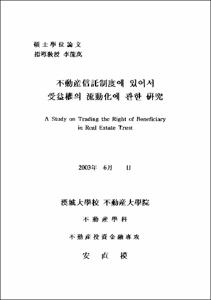不動産信託制度에 있어서 受益權의 流動化에 관한 硏究
= (A) Study on Trading the Right of Beneficiary in Real Estate Trust
- Files in This Item:
-
-
Download
 000000066429.pdf
기타 데이터 / 2.77 MB / Adobe PDF
000000066429.pdf
기타 데이터 / 2.77 MB / Adobe PDF
-
Items in Repository are protected by copyright, with all rights reserved, unless otherwise indicated.